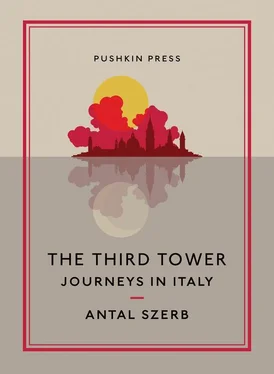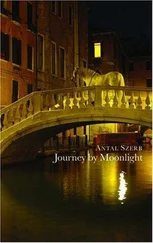Most venerated of all are the last items on the itinerary: the sacred mosaics of the San Vitale, in Ravenna. More than anything, they had represented the tortured spiritual yearnings of his adolescence — as so memorably evoked in Journey by Moonlight :
Elbows on the table, they studied the plates, whose gold backgrounds glittered up at them like a mysterious fountain of light at the bottom of a mineshaft. Within the Byzantine pictures there was something that stirred a sleeping horror in the depth of their souls. At a quarter to twelve they put on their overcoats, and, with ice in their hearts, set off for midnight mass… For a month afterwards it was all Ravenna, and for Mihály Ravenna had remained to that day an indefinable species of dread.
Like the sinister back alleys of Venice, they are another critical test for him. There is a world of buried anguish, but also of relief, as it slowly dawns on him: “So, this was the real goal of my travels, this run-down and evil-smelling town.”
It is almost the end of the road. His journey is effectively over, its purpose seemingly accomplished. The way home lies through Trieste, another historic city with a wealth of associations, should he still be in the mood.
But all Szerb’s writing contains an element of surprise, and though he doesn’t know it yet, the most important discovery is still to come. Italy has retained its greatest gift for him for the last. It is one that will sustain him in the difficult times ahead, just a short way down the road, when rumours of war are no longer just rumours, and all question of travel has, for him, finally come to an end.
LEN RIX, 2013
I INITIALLY wanted to go to Spain, but Spain, in this most horrific summer in all its history, did not seem a very welcoming place, with its opposing radio stations taking turns to howl in triumph over the destruction of everything in the world for which one would want to visit that country. Perhaps I shall never get there now; and if I did, I would no longer find what I went to see. From time to time history seems to forget a particular city or citadel — a Nuremberg, an Oxford, a Toledo — tucked away behind its back. But this is mere absent-mindedness: a signal arrives, and amid wars, revolutions, catastrophic upheaval and the hammer blows of “progress”, its impermanence is laid bare.
Then it occurred to me that I simply must go to Italy — while Italy remains where it is, and while going there is still possible. Who knows for how much longer that will be; indeed, for how much longer I, or any of us, will be able to go anywhere? The way events are moving, no one will be allowed to set foot outside his own country. The Germans have long found it almost impossible to venture abroad, with a fine of a thousand marks for attempting to visit Austria. The Russians too have been denied this right for a great many years. Foreign travel is not one of life’s basic needs. No doubt the totalitarian state will sooner or later decree that the true patriot is the one who stays at home.
And this is why, whenever I travel to Italy, I go there as if for the very last time, and why, when I first set eyes on any of its towns, it is as if I am not just returning, but bidding it farewell. Dostoevsky writes that we should live as if our every minute were the last moments of a man condemned to death: that way, we would grasp the ineffable richness of life. My impressions of Italy always feel like the last visions of a dying man.
I TRAVELLED to Italy in a headlong rush, a blind panic, only half packed, without attending upon the deities of the National Bank’s foreign exchange department, barely pausing for breath, straight to Venice. The heat was sweltering, the city bursting at the seams, and I was moved on, with varying degrees of brusqueness, from hotel to hotel. They say the city had never known such a season. The Spanish resorts were being bombed, and in the French ones the waiters were going on strike at every second mealtime. In the early morning, when the late-to-bed had finally retired and before the early risers were up, there was not a single lodging, of any description, to be had in the city — if we ignore the odd German dozing until dawn on the coffee-house terraces to save the expense of a hotel. It was certainly not pleasant to arrive in the heat, in this pampered city, crammed as it was with the world’s fashionable riffraff, and be forced to wander for hours looking for somewhere to lay my head. But I drew enormous comfort from the simple fact that I was there. Whether things were going well or badly, whether I was miserable or happy, meant nothing beside the fact that it was there , in Venice, that I was happy or unhappy, that things were going well or badly. Life is not always and everywhere uniformly “real”. How wise were the great scholastics who distinguished between degrees of being, rising by regular gradations of reality towards perfection.
No, I didn’t “enjoy myself” or “feel at home” in Venice, in the commonly accepted, physical-emotional sense of these terms. But, for the entire length of my stay, I was filled with elation by the mere fact that I was there, and that, by sharing in the life of that exalted sphere, I was more completely myself.
VENICE is the centre of the world. Or rather, one of its centres, for the world has several. It tilts on various axes, its prevailing truths are legion; the “one thing needful” takes many different forms. In St Mark’s Square you really have a sense of being at the centre of the world — just as you do in several places in Rome, or at the Place de l’Opéra in Paris. London has none of these sites. London may be the greatest city on Earth, and the most populous, but it remains somewhere out on the periphery, not at the centre. It has no St Mark’s Square. Following Valery Larbaud’s principle, one might describe it as village-like in its isolation. A man strolling around St Mark’s Square knows that by doing so he is performing a kind of function, just being there, at the centre of the world, letting the world revolve around him.
Venice is the city of intimate closeness. The most human-scale of all cities. Here Western culture’s Faustian rush to infinite expansion comes to a halt. Venice cannot “develop”. It cannot become any larger than it already is, because every square inch of available dry land has long been crammed full. Nor is there very much of it. Wherever you set out from, the city can be traversed from one end to the other in half an hour, almost all of it on foot. Everything is to hand, and distant objects are brought close enough to touch. Great seafaring ships make their way between the rows of houses, for here the wide ocean comes home. That is perhaps why Venice is more of a city than any other. It holds more. It is more of a home.
Darkness is gathering over the lagoon where it touches St Mark’s Square, bringing the silhouette of San Giorgio Maggiore, the Giudecca Island and Santa Maria della Salute into sharp relief, and making them more than ever the standard schoolroom example — a paradigm of inflection, like amo-amas-amat —of the beauty of landscape and the works of man. And the soft radiance of its brick-pink serenity spills out over the city — this city that exists in the spontaneous sense of nostalgia experienced by everyone who feels, on arrival, that he must have been here before, though he has never previously set eyes on it.
AND ONCE AGAIN, with the same expectation and excitement, I wander through the back alleys of Venice. These streets are wonderfully narrow. There are some so narrow that two overweight men cannot pass through them walking side by side. Even the broader ones are only wide enough for the traffic of a bygone age. One Easter Sunday I saw for myself how one of these passageways can become so crowded that the flow comes to a complete stop, unable to move forward or go back. Only very slowly, step by step, after a good half-hour’s wriggling and squeezing, could you fight your way free from a street just one hundred metres long.
Читать дальше












